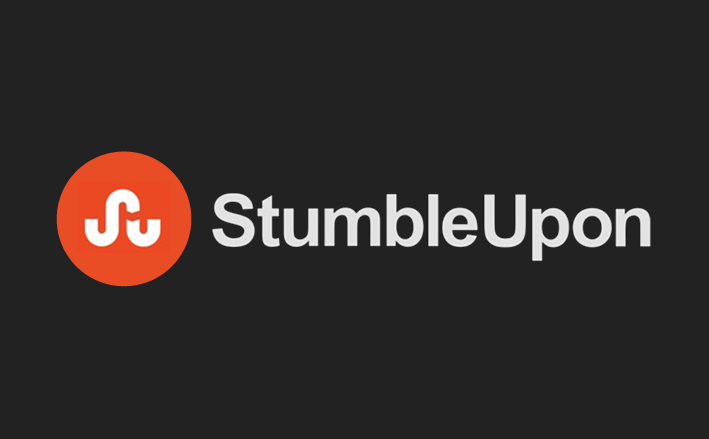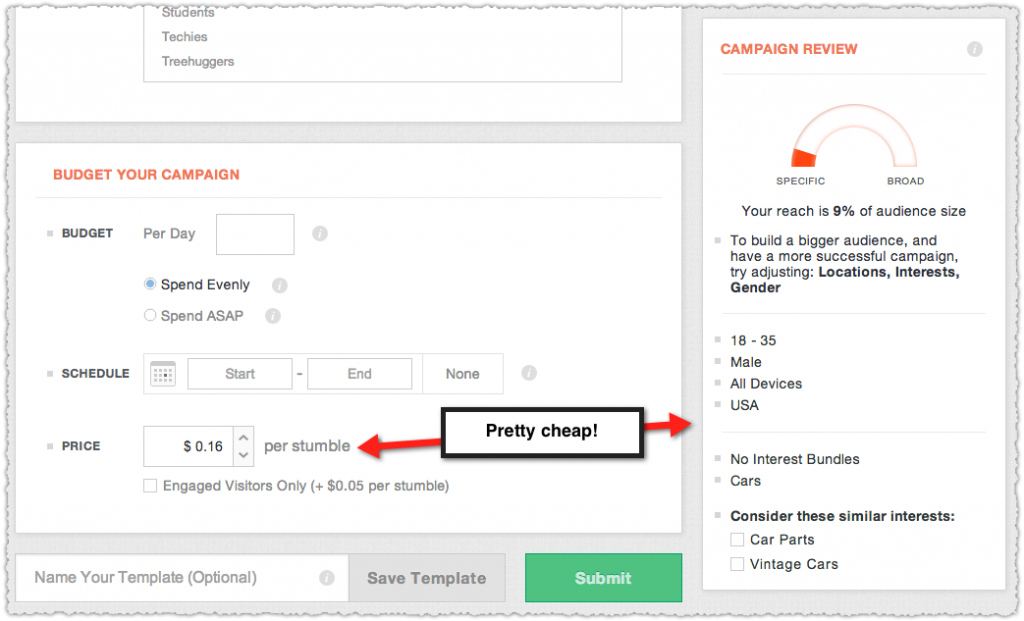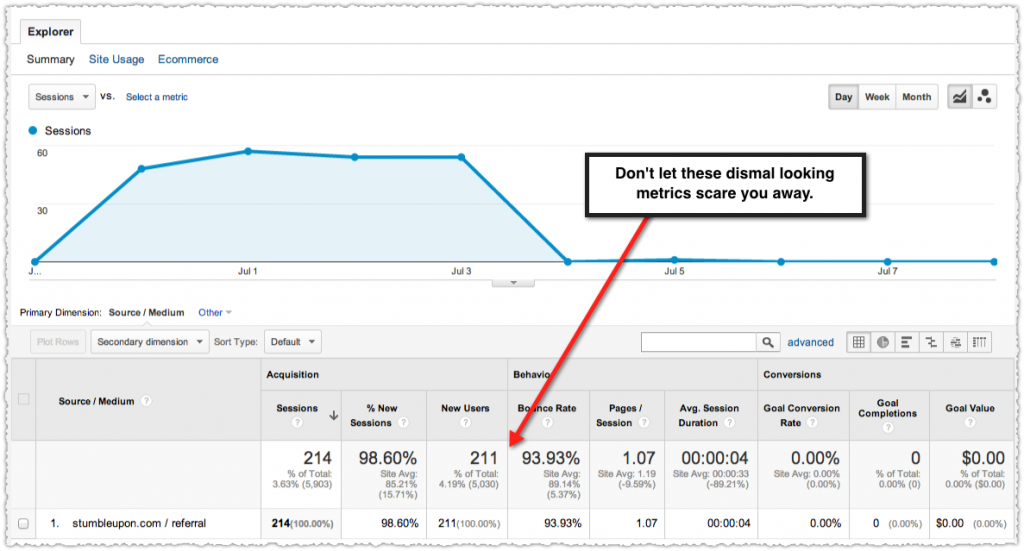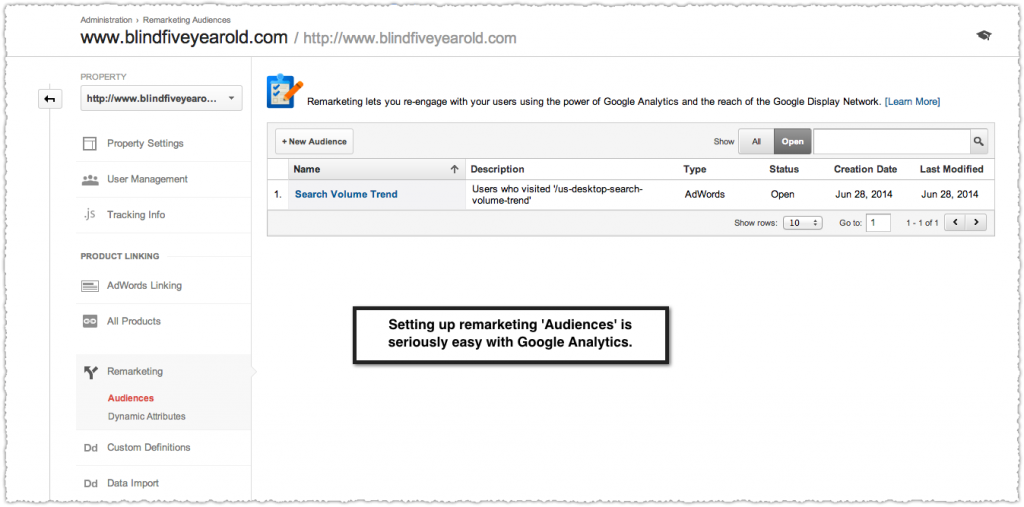For years I’ve used a combination of StumbleUpon and Google Remarketing to cheaply and efficiently open the top of the funnel for start-ups.
I don’t hear much about this tactic (though perhaps I’m not looking in the right places) so here’s a little explanation on this handy growth hack.
StumbleUpon

You remember StumbleUpon right? A darling of the Web 1.0 world, it was purchased by eBay in 2007 where it was largely ignored until it was bought back in 2009. It doesn’t get a lot of press but it’s still a well-trafficked property and product.
I’m not saying it’s in some sort of renaissance or anything. But it delivers traffic and has benefits many overlook.
Paid Discovery
You can buy ‘Stumbles’. That shouldn’t be news to you since you’ve been able to do that for ages. But … StumbleUpon has been overshadowed by other platforms so I often get a furrowed brow and a ‘you learn something new everyday’ response when I tell people this.
The paid StumbleUpon product is called Paid Discovery. Like nearly any paid ad product today you can target StumbleUpon users by geography, age, gender and interest. This is important since you only want to find people who are interested in your site or product.

The news gets even better because you can buy these targeted visits on the cheap from anywhere from $0.10 to $0.20 a click. It used to be cheaper but it’s still a bargain for guaranteed targeted visits.
Now, there is often some discrepancy between paid Stumbles and what shows up in Google Analytics due to various issues. You can obsess about this or simply shrug your shoulders and move on. I recommend the latter.
I figure I’ll make up the difference based on earned Stumbles, those StumbleUpon visits you get for free because your content has been well received.
Low Engagement
If you’re familiar with StumbleUpon you know that the product itself encourages low engagement. You ‘Stumble’ from one site to the next in a Tumblr for websites like fashion. It’s sort of like channel surfing on TV when you’re bored and looking for something interesting, yet not really having the time to watch for long anyway.
Marketers complain that StumbleUpon traffic has a 90%+ bounce rate and 1.1 page views per visit. And they’re not wrong. Here’s a look at the metrics for the campaign I launched to show how this works.

This is why most marketers write off StumbleUpon as a viable channel. Yet, if you’re creative, you can use the limitations of StumbleUpon to your advantage.
And I have, time and time again.
Forced Brand Exposure

The first thing to recognize is that StumbleUpon essentially forces visits to your site. This means you don’t have to deal with ad blindness or click-through rate issues to get exposure.
The problem with many StumbleUpon campaigns is that they don’t create a page that will work at a glance. Because it’s not about engaging on that visit. Don’t try to encourage an activity that is antithetical to the product. User engagement metrics should be largely ignored when using StumbleUpon.
The job of a StumbleUpon visit is to ensure that the user leaves remembering your site and what you’re offering. So the page has to be designed with five foot web design in mind and should be laser focused, passing any five second test with flying colors.
StumbleUpon is about getting brand and marketing message exposure.
You’re hoping that they’ll return later via another channel. I’ve seen strong correlations between an increase in direct traffic in the weeks after a StumbleUpon campaign. This would indicate that some people do remember that exposure and come back directly as a result.
But it’s awful hard to prove with all the mitigating factors.
Stumble Remarketing

The good news is that there is a better way to get those brand exposures to come back to your site. Remarketing!
All you need to do is set a remarketing tag on that specific StumbleUpon page and you suddenly have the ability to market to a specific and relevant group of people who already have a nascent idea of your site or product.
I like having a dedicated StumbleUpon campaign page so you can isolate this group from other groups when you’re doing more complicated remarketing campaigns. It’s just far simpler to manage and measure.
Easy To Set Up
It’s a snap to set this up now that you can create Google remarketing lists (aka Audience) using Google Analytics.

Here I’m simply targeting those users who visit my new search volume trend page. You do have to tweak your Google Analytics code to enable remarketing, which isn’t that hard if you’re willing to tinker. It’s even easier if you’re using Google Tag Manager.
Then you create your StumbleUpon campaign and watch as users ‘Stumble’ to your page and fill up your new Audience. At that point you can then go to AdWords and build a remarketing campaign using that Audience.
I won’t give the step-by-step instructions here unless there’s an outcry of folks for this level of detail.
StumbleUpon+Remarketing=Win

Even at $0.20 a visit I can take $5,000 and turn it into a list of 25,000 targeted users that I can target via remarketing for a loooong time.
Yes, the remarketing will also cost you some money but those clicks will be qualified clicks and will convert at a high rate. Not only that but if you’re smart you can use remarketing to gain extra brand exposures that produce additional view-through visits and conversions.
Stumble remarketing opens and fills your funnel with relevant users.
All you have to do is combine a remarketing tag with this targeted traffic source!
First This, Then That

My idea was to demonstrate this with a new page on my site dedicated to monthly updates to US desktop search query volume. I’ve tracked this metric for a long time and figured I would create a dedicated page for it and use StumbleUpon to announce and launch it. Then I’d use remarketing when the next month’s data was live and the graph was updated.
I screwed a few things up though so the test didn’t work quite as I’d planned. (User error!) And I haven’t seen new June numbers from comScore yet and was getting itchy to post this. But the idea was solid.
Have a defined plan behind the two exposures.
In my case I was looking to get people’s attention with one interesting graph and commentary. Then I’d bring them back with a remarketing ad when the graph was updated with a new month’s data. The ad could be the graph with a ‘see updated search trend’ call-to-action or any number of creative treatments. In a best case scenario I would also have created a subscribe option for the page itself once users got there again.
If you have a product you’re trying to sell you might have the first ‘Stumble’ exposure introduce the product and brand. The second ‘remarketing’ exposure could be a benefit message, a free white paper download or a coupon for a product trial. In some ways the first exposure is advertising and the second is marketing.
You’re a marketing boxer hitting users with a combination one-two punch.
TL;DR
By combining StumbleUpon Paid Discovery with Google Remarketing you can quickly and efficiently open and fill the top of the sales funnel. Use StumbleUpon’s low-engagement context to your advantage and deliver a memorable first impression that you then build on through additional remarketing exposures.
The Next Post: Twitter Analytics
The Previous Post: You Won’t Remember That Infographic

3 trackbacks/pingbacks
Comments About StumbleUpon Remarketing
// 6 comments so far.
Bill Bean // July 21st 2014
Brilliant!
Is someone making funnel cakes?
Ceebeecee // July 21st 2014
Found this article via digital point, so I was already pleased not to have to hear about another Google gossip update about the search giant giving more weight to the letter V than Y… etc. ad nauseum….
A brilliant discovery. Nicely written and explained, so everyone can understand it.
Thank you.
Jon // July 22nd 2014
Thanks AJ. Big fan of SU but I’m one that has pretty much written it off for marketing, unless you want to impress a client that wont dig any deeper into impressive-looking GA…
Do you think businessy content can do well with this method? Or would you have to make it more social, fun and light? There can’t be many with insurance set as an interest in SU for example.
anthony pensabene // July 23rd 2014
hey AJ,
saw you post a Lucy pic couple weeks back. a young muse frequented margate often in his younger years… Adams Ave represent
i have two clients in particular i’d like to align with the 1-2 punch above. one is a review-based site – id like to do something visually (humorous) for the initial notice and then follow-up with some sort of resource guide (“The state of (what they review 2014”)
secondly, i work with another psych-based client and again would like to do something funny (maybe diagnosing cartoon figures with personality disorders) just for the initial haha and then follow-up with a cohesive psych resource. any suggestions, guidance, criticism, banter is always appreciated.
thanks, AJ
– anthony
John A. // August 06th 2014
Hey AJ. I love the fun way you in which you presented this article. I had a lot of fun reading it and I took some notes about SU. Best regards, John.
Matt Mikulla // August 12th 2014
I’m wondering how well this would tie in with Facebook website custom audiences to target visitors to your site from Stumbleupon once they are on Facebook?
Sorry, comments for this entry are closed at this time.
You can follow any responses to this entry via its RSS comments feed.